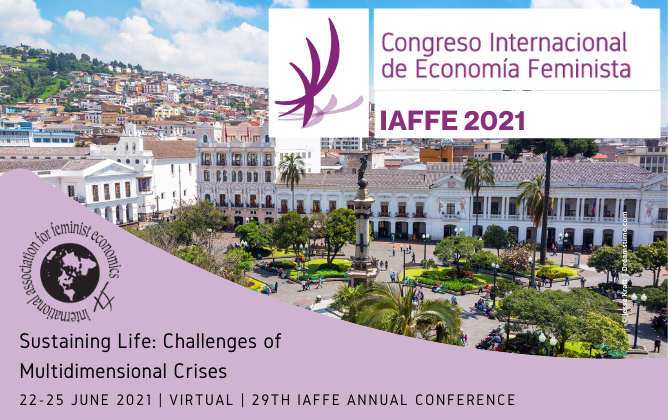IAFFE 2021 ANNUAL CONFERENCE
SUSTAINING LIFE: CHALLENGES OF MULTIDIMENSIONAL CRISES
care work and the economy (cwe-gam) panels
Those Who Care: Improving the Lives of Caregivers and Workers
Wednesday, June 23rd, 3:30 - 5:00 pm edt
Chaired by Elizabeth King and Ito Peng
This panel contributes to the ongoing efforts to illustrate the intersectionality of care provisioning, economic growth, and distribution. Setting the context in South Korea, known for its rapid economic growth rate and equally rapid fertility decline and increasing need for care, research papers included in this panel are analyses by the Care Work and the Economy Project researchers, who utilize various unique surveys to explore the quality of life of family caregivers, the commitment level of paid care workers, and the uneven impact of South Korea’s COVID-19 social distancing measures on mothers. A post-Kaleckian feminist model is also introduced to analyze the effects of public social expenditure and gender gaps on output and employment, building on Onaran, Oyvat and Fotopoulou (2019), and extending it with an endogenous labour supply and wage bargaining model
PAPERS PRESENTED:
The Effects of Public Social Infrastructure and Gender Equality on Output and Employment: The Case of South Korea
Authors: Cem Oyvat and Ozlem Onaran
The Quality of Life of Family Caregivers: Psychic, Physical and Economic Costs of Eldercare in South Korea
Authors: Jiweon Jun, Elizabeth King, and Catherine Hensly
Quality of Care, Commitment Level, and Working Conditions: Understanding the Care Workers’ Perspective
Authors: Shirin Arslan, Maria Floro, Arnob Alam, Eunhye Kang, and Seung-Eun Cha
Impacts of COVID-19 on Work-Family Balance in South Korea: Empirical Findings and Policy Implications
Authors: Ito Peng and Jiweon Jun
Seeking Gender Aware Applied Modelings: Case of South Korea
Thursday, June 24th, 3:30 - 5:00 pm edt
Chaired by Young Ock Kim
The starting point of this panel session is to develop macroeconomic tools that integrate care and gendered dynamics both in labor markets and within households, including interactions between paid and unpaid care work and private and public care provisioning. This session shares the results of gender aware applied modellings and micro simulations for South Korea. This modelling approach allows one to assess the full range of gender distributional effects that might result from a variety of economic and social policies as well as their fiscal sustainability. These sorts of assessments are crucial for enabling policymakers to effectively respond to the challenges posed by demographic and technological changes in the context of the 2030 Agenda for Sustainable Development. Policy questions that will be answered include, among others: What sort of fiscal policies (public spending and/or taxation) are likely to be most effective at reducing gender gaps in paid employment? What form of public investment can best contribute to reduce and redistribute unpaid work both across genders and socio-economic groups.
PAPERS PRESENTED:
Child and Elderly Care in South Korea: Policy Analysis with a Gendered, Care-Focused Computable General Equilibrium Model
Authors: Martín Cicowiez and Hans Lofgren
Care Support Ratios in Korea and the US
Authors: Gretchen Donehower and Bongoh Kye
Towards a Caring and Gender-Equal Economy in South Korea: How much does the regulation of labor market working hours matter?
Authors: İpek İlkkaracan and Emel Memis
CWE-GAM Participation
Panel: “Who Cares? Addressing the care crisis in the COVID-19 response”
Wednesday, June 23rd, 9:00 am - 10:30 am EDT
CWE-GAM Presenter: Maria S. Floro
Round Table: Economic impacts of violence against women: Exacerbating multiple crisis.
Wednesday, June 23rd, 9:00 am - 10:30 am EDT
CWE-GAM Chair: Maria S. Floro
CWE-GAM Presenter: Ana Maria Tribin
Presentation: Who cares? Sharing the burden of caregiving within the family
Thursday, June 24th, 3:30 pm - 5:00 pm EDT
CWE-GAM Presenters: Hannah L. Randolph, Elizabeth King, and Jooyeoun Suh
Presentation: Structure and drivers of the quantity and quality of women’s work in Latin America
Friday, June 25th, 1:30 pm - 3:00 pm EDT
CWE-GAM Presenter: Elissa Braunstein
Presentation: Epistemology of Feminist Economics: An Analysis of Authorship, Methodologies, and Scope
Thursday, June 24th, 3:30 pm - 5:00 pm EDT
CWE-GAM Presenter: Elissa Braunstein
Presentation: Employment Impacts of Informal Elderly Care on The “Sandwiched-Generation” Women in Turkey
Friday, June 25th, 9:00 am - 10:30 am EDT
CWE-GAM Presenter: Emel Memis
Presentation: Researching Under Authoritarian Regimes
Wednesday, June 23rd, 1:30 pm - 3:00 pm EDT
CWE-GAM Presenter: Ipek Ilkkaracan
Roundtable: Creating caring economies
Wednesday, June 23rd, 1:30 pm - 3:00 pm EDT
CWE-GAM Presenter: Diane Elson
Presentation: Wages for Housework: A Campaign Revisited in the Age of the Pandemic
Friday, June 25th, 9:00 am - 10:30 am EDT
CWE-GAM Presenter: Diane Elson
Thursday, June 24th, 1:30 pm - 3:00 pm EDT
CWE-GAM Chair: Ana Maria Tribin
Presentation: The State of Care Economy in Colombia
Friday, June 25th, 1:30 pm - 3:00 pm EDT
CWE-GAM Presenter: Ana Maria Tribin
Presentation: The Labor Market Effects of the Venezuelan Exodus on High-Skilled Female Workers: Evidence from Colombia
Wednesday, June 23rd, 9:00 am - 10:30 am EDT
CWE-GAM Presenter: Ana Maria Tribin
Friday, June 25th, 1:30 pm - 3:00 pm EDT
CWE-GAM Presenter: Mieke Meurs
Presentation: Understanding the Hidden and Invisible Workforce – Women’s Labor Force Participation in Pakistan
Wednesday, June 23rd, 9:00 am - 10:30 am EDT
CWE-GAM Presenter: Mieke Meurs
Presentation: Cheap Praise: Supplemental Pay for Essential Workers in the 2020 COVID-19 Pandemic
Friday, June 25th, 1:30 pm - 3:00 pm EDT
CWE-GAM Presenter: Nancy Folbre
Presentation: (She)cession: The Colombian female staircase fall.
Friday, June 25th, 1:30 pm - 3:00 pm EDT
CWE-GAM Presenters: Paula Herrera Idarraga and Ana Maria Tribin
Presentation: ¿Crisis del cuidado remunerado? Una mirada crítica a la clasificación sectorial de la economía colombiana
Wednesday, June 23rd, 3:30 pm - 5:00 pm EDT
CWE-GAM Presenter: Paula Herrera Idarraga
Presentation: Measuring patriarchy: Meso-level variations in the strength of patriarchy in sub-Saharan Africa
Wednesday, June 23rd, 9:00 am - 10:30 am EDT
CWE-GAM Presenter: Ajit Zacharias and Thomas Masterson
Friday, June 25th, 9:00 am - 10:30 am EDT
CWE-GAM Chair and Presenter: Thomas Masterson and Ajit Zacharias

